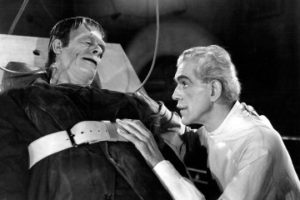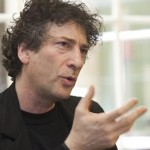[2.5-minute read. NOTE: this post has nothing to do with the sports-men, Kornheiser and Wilbon, and their high-energy exchanges. I only interrupt myself.]
Jumpstarting a depleted battery. Cranking the old Model T. Applying the paddles to a flatlined patient. Making the Monster LIVE!
Whatever. (Insert your own favourite new-life, Renaissance, man! analogy here.)
I’m back at the controls of the Good Ship Howdy. Hurray! Below, I exhume and quote from an older piece of mine. I just re-read it, quite by chance, and it felt like a good way to help recharge by weary bloggish batteries and get GOING. It also serves to remind readers of one of my favourite things to do on This Little Site of Mine. (I’m gonna let it shine!) Yes, it’s been eerily, fear-ily quiet here at The Howdy. I keep telling myself there’s a silver lining: my recent inactivity has meant that a special piece, much more important than the bookish or sporty matters I often obsess about, was at the head of the Howdy Queue for months. (It’s just down below, in this “At First Glance” section, which is the main one.) A celebration for the age.)
Here I go again. A week ago, when I wasn’t watching, this space hit a small milestone. (It’s a small consolation that, even when I’m not grinding at the word mill, humans are still reading my messages to the universe. Sweet.) 40,000 page views is a decent month for many sites, and it’s taken me quite a few years to get here, but it’s something. I insist that many of those views involved people actually reading what I’ve written, so there! Yes. Thanks for reading, for reading me, for reading just about anything. READING MATTERS. And now this, a blast from the Oh-So-Quotable! JamesHowden past (complete article here):
He Said/She Said… Did you notice this FAVE-QUOTES section? It’s just down there, on your right, if you’re looking at this on a laptop or other big-screened device. There’s no up-top tab for this “He Said/She Said” section, but you can find it if you try hard, maybe?
I’m always looking for the right words. Some people look for the magic bullet – the easy lazy remedy, the simple common-sense answer. Some look for solace and conviction in chemical form, but for me it’s nearly always an incantation. If a problem can’t be solved with words, I’m often not interested in it….
I’ve collected quotes forever. Once upon a lucky break, I was suddenly being paid well to write with her Right Honourable Self¹, and she loved quotations, too. So I scavenged everywhere, tore from newspapers, scribbled in the margins of novels and other good reads, and I cheated: I went to Bartlett’s, to John Robert Columbo, to Cosmo Doogood’s Urban Almanac, to on-line sites like Empyrean. I love to find just the right words….
There be monsters in the quotable woods, though. I remember Mr. Hill’s comments on a high school essay that I had just larded with some of the best quotes ever. Problem: some of them I hadn’t fully understood, when removed from the context in which they were written, and “this is the evil of Bartlett’s”, quoth Mr. Hill. Who knew a treasure house of words could be evil? And then there was my recent discovery that one of my favourite quotes of Ralph Waldo Emerson – beginning “To laugh often and much, to win the respect of intelligent people and the affection of children…” and ending “This is to have succeeded” – is “almost certainly not his”, according to a scholarly website that I accidentally consulted….
All this to say that I have a wee quote box just down there to your right, underneath the “On Second Thought” section…



